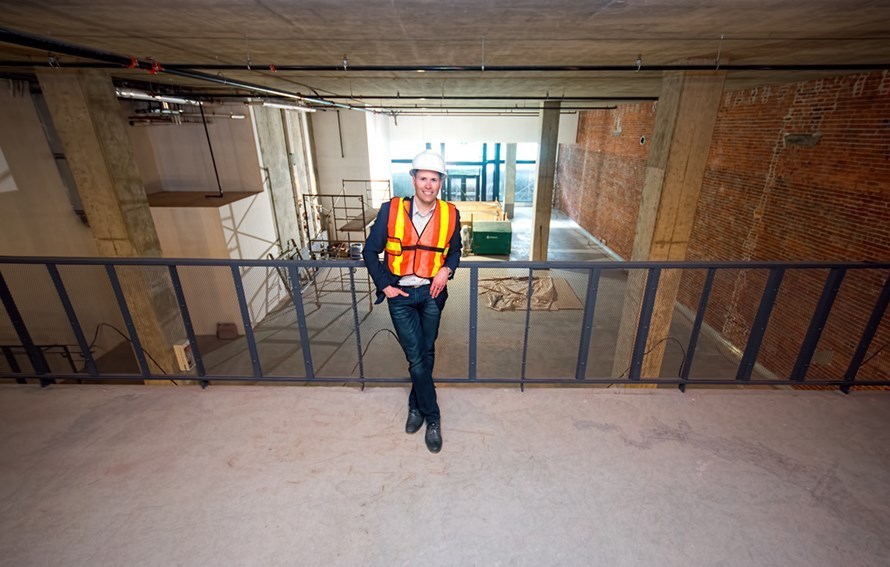Wayne Berger, CEO of IWG PLC’s North America and Latin America division, says the tilt towards suburban offices isn’t going away after nearly a year and a half of workers growing accustomed to the short commutes from their bedrooms to their home offices.
“I absolutely believe that our kids will look at us one day and say, ‘Dad, tell me about the time that you used to drive an hour a day, each way, to go to an office just to put your laptop and your phone down on a place that was designated yours every single day,’” said Berger, whose company offers co-working spaces to companies and workers.
It’s currently facilitating efforts from multinational bank Standard Chartered PLC and Japanese telecom giant NTT Communications to provide space to a combined 400,000 employees.
IWG is now preparing to open its third location in Surrey and has tripled its presence in Victoria and doubled its presence in Kelowna since the pandemic began.
“There will be a return to work towards the downtown core, there’s no doubt about it. It hasn’t really started yet; it’s still quite tepid in Vancouver. But what we’re seeing is … more companies move towards flexible working as their strategy moving forward,” Berger said.
“The suburbs are going to continue to accelerate in demand, primarily because it just helps eliminate this complete idea of commuting, and it helps people stay closer to where they need to be or want to be depending on the day.”
He said companies that don’t institute a flexible work policy will find themselves on the losing end of the battle for talent, likening the ability to live and work in the same vicinity to a European town square.
“All the supporting businesses around where workers live and work flourish because you have all this localized density of workers around,” Berger said.
The concept of working closer to where you live is gaining traction in unique ways across Metro Vancouver.
When the heat dome hit B.C. in June, a Port Coquitlam brewery put out a call on social media: any remote workers wanting escape the suffocating temperatures could hit the establishment for its air conditioning and solid Wi-Fi connection.
A few employees at Burnaby tech company Traction on Demand (Traction Sales and Marketing Inc.) – a cohort of white-collar workers working remotely for much of the pandemic – gave it a shot.
Traction is now exploring the possibility of making the arrangement more formal as the company specializing in Salesforce consulting and app development prepares to bring workers back into the office, according to chief of staff Megumi Mizuno.
The PoCo brewery is not a one-off. Traction is also putting out feelers to launch small satellite offices throughout the Lower Mainland in coffee shops, bike repair centres and even restaurants that typically only serve dinner.
“We are looking for space in Vancouver proper, but we also have a number of larger groups that live in the Tri-Cities, North Shore, Burnaby,” Mizuno said. “Everyone’s fine working at home, but they miss that kind of Traction community feel.… But also there are these businesses that have struggled for the last 16-18 months and could use a little bit more guaranteed income.”
The latest Metro Vancouver office vacancy data gives credence to a move to suburban spaces.
In the second quarter of 2021, the lowest office vacancies were being seen in Surrey, at 4.3 per cent, the North Shore, at 2.9 per cent, and the Tri-Cities, where only 1.2 per cent of offices were vacant a full year into the pandemic, according to survey from JLL Canada, a commercial agency, released July 27.
As comparison, Vancouver’s downtown office vacancy rate is 6.3 per cent and spikes to double-digits in both Yaletown and Gastown, JLL reported, which were once the core of co-working space.
In the second quarter 2021, total absorption of office space (the amount of leased space compared to the amount of space shoved back onto the market) went negative downtown by 264,000 square feet, JLL noted, while it was positive by 54,000 square feet in the seven suburban markets surveyed.
But the downtown core isn’t quite dead, according to Colin Scarlett, executive vice-president of Colliers Canada in Vancouver.
“We haven’t seen a mass exodus out of the downtown core. I don’t think we will,” he told BIV.
A June report from Colliers suggested many businesses still aren’t being accommodating to employees angling for a more flexible work arrangement.
“Although there is a rise in housing sales in suburban regions – for instance Fraser Valley, Pitt Meadows, Richmond, and Surrey – these areas are still within commuting distance of Vancouver’s downtown core via car or the SkyTrain, with no fundamental impact on the office demand side,” the report stated.
“Along with this, amidst the current circumstances caused by the pandemic, a typical five-day work from the office is no longer the norm, and hence employees will find the longer commute, fewer days a week more palatable.”
-30-



